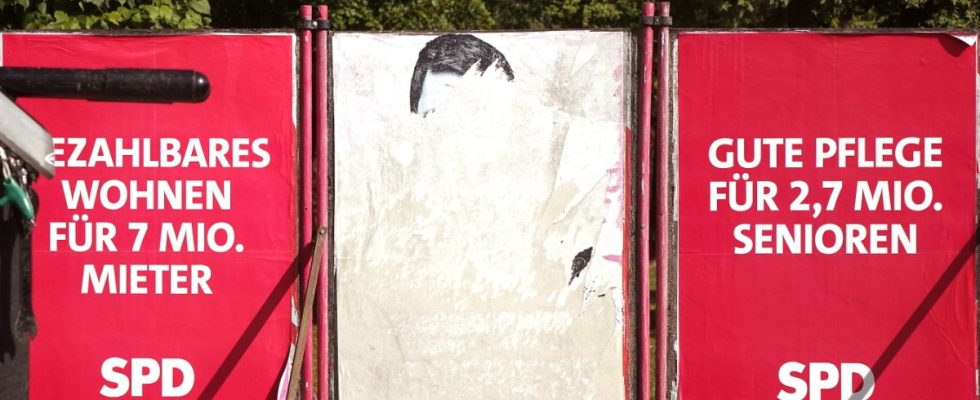The Vice President of the State Parliament is one of the candidates who stick many of their posters to the stands themselves. Markus Rinderspacher (SPD) estimates that he applied the paste and attached the motif around 1,000 times in his Ramersdorf constituency during this election campaign. But he has never experienced what happens afterwards in such a poignant way. “In no other election campaign has our party property been damaged with such destruction and targeted attacks as in this one. On some nights the perpetrator or perpetrators specifically go to poster stands, street by street in the district, in order to tear down the posters.”
But that’s not all, some go further. “Wooden panels are repeatedly kicked in and metal stands are vandalized with kicks,” explains Rinderspacher. For him it is no longer a case of random vandalism. “There is no doubt in my mind that these are not stupid boy pranks, but rather planned, targeted destruction with political intent,” he says. In his voting district alone, the financial damage runs into the thousands.
What State Parliament Vice-President Rinderspacher is experiencing is what his party, the Greens and the AfD are fundamentally stating: the destructiveness and aggression against their election advertising is particularly great in this election campaign. The FDP and the Free Voters speak of a slight increase in damage. The CSU, in turn, reports that the attacks on its election advertising were more severe five years ago. “The damage in the 2023 state election campaign falls well short of this significant property damage,” explained a spokesman. At that time, the CSU had to contend with a particularly heated atmosphere following statements made by its party leadership on the subject of asylum.
This summer, the Greens even had to experience one of their volunteer poster pasters in Riem being attacked by a woman with acetic acid. The campaign worker was just able to get out of the way. In addition, the Environmental Party has recorded 50 percent more attacks on election advertising compared to the 2021 federal election. Even then, the Greens had to re-stick damaged posters, “but not with this extreme frequency,” explained a spokesman.
The MPs Benjamin Adjei (Moosach constituency) and Gülseren Demirel (Giesing) were also racially insulted and hostile on posters. In such cases, the Greens file criminal charges. In the case of other graffiti, however, not so much because the perpetrators are almost never caught anyway. Around 70 percent of the damage is caused by the tearing down of posters. “There are locations where posters are fighting battles with individual vandals, and these have to be redone every day,” say the Greens. “On average, almost twice a week.” The top candidate Katharina Schulze is noticeably affected frequently.
Things were even worse in the last election, according to the CSU. But posters are also being torn or destroyed in this election campaign.
(Photo: Robert Haas)
This FDP poster also probably made someone angry.
(Photo: Robert Haas)
In this case, it is hardly noticeable that the AfD is campaigning here.
(Photo: Robert Haas)
The Greens regularly put up posters, on average twice a week.
(Photo: Robert Haas)
The Free Voters recorded a slight increase in damage.
(Photo: Robert Haas)
The AfD also observes that “the destruction of our posters in this election campaign is even worse than in previous ones.” This was explained by city councilor Markus Walbrunn, who is applying as a direct candidate in Pasing. There would be no more sticking up on Friday and Saturday because otherwise the posters wouldn’t survive a day. 80 to 90 percent were damaged within 72 hours. According to Walbrunn, the damage across the four Munich district associations is five-digit.
The situation with the FDP and Free Voters is less noticeable. “We are recording significantly more damage than in 2021, but we have also put up more posters. Relative to this, the damage rate has at most increased slightly,” says FDP city chairman Michael Ruoff, who is running as a direct candidate in Bogenhausen. The Free Voters have the impression that the number of damaged posters is increasing slightly. “Most of the posters are smeared or broken, sometimes completely dismantled or disappeared,” explained a spokesman. This often occurs in places that are difficult to see, “where there is little light at night.”
A spokeswoman said the police could not draw a comparison to the last state election due to a lack of data. This year, the Munich Presidium registered 65 politically motivated crimes that were directed against election posters. However, the number could increase significantly if the parties report new cases by the end of the election campaign or only afterwards.
There are different opinions about the reasons for the vandalism. The SPD cites the general political situation, crises and also “increased polarization of society”. The Free Voters also cite “the increasing social division and the associated brutalization of the discourse”. FDP city boss Ruoff has noticed a dwindling tolerance. “Apparently a growing part of the population has a problem with the opinions of others.” And the Greens see “the tightening of tone in the election campaign” as the cause of such acts.
Some parties suspect that the attacks could be systematically organized. “There are also instructions from left-wing groups for the targeted destruction of AfD election posters, which have the result that the destruction of election posters generally appears legitimate as a means in democratic disputes,” says the liberal Ruoff. The AfD also suspects “a very structured approach by groups”.
The Greens assume that the long period of permitted poster display could also lead to attacks. “A certain weariness among people encourages the defacement of the posters,” said the spokesman. “The more destruction we see, the more imitators it creates.” The Munich CSU leader and Bavarian Justice Minister Georg Eisenreich reminds us that such attacks are not trivial offenses. “Smearing and destroying posters, for example, is disrespectful and also punishable.”

